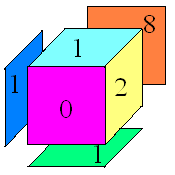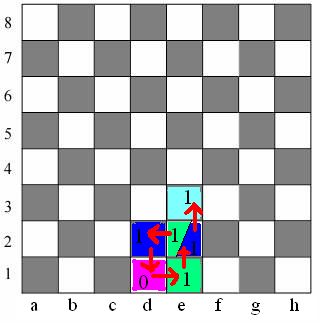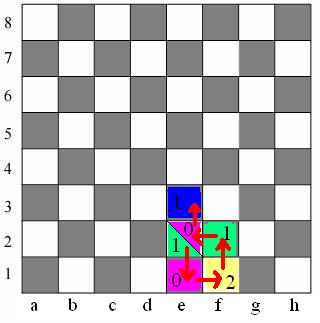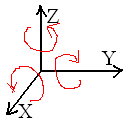Timus 1016. A Cube on the Walk
1016. A Cube on the Walk
Memory Limit: 16 MB
Input
Output
Sample
| input | output |
|---|---|
| e2 e3 0 8 1 2 1 1 |
5 e2 d2 d1 e1 e2 e3 |

这道题目是说,一个立方体放在国际象棋棋盘的一个格子上,该立方体每一面都和棋盘的格子一样大。该立方体每一面都标有一个非负整数。你可以在棋盘上滚动该立方体,在这期间计算立方体底面数字的和。你的任务是找出一条从给定的起点到终点的路径,使得前面所说的和最小。
输入只有一行,使用空格作为分隔符。首先是棋盘上的起点和终点的坐标,然后是立方体上的六个整数,按顺序为:前、后、顶、右、底、左面。举例如下: e2 e3 0 8 1 2 1 1 。
输出也只有一行,使用空格作为分隔符。首先是所求的最小的和。然后依次给出所求的路径的坐标。举例如下:5 e2 d2 d1 e1 e2 e3 。这个路径共六步,其长度为:1 + 1 + 0 + 1 + 1 + 1 = 5 。
上面的输入和输出的例子是题目中给出的。其实同一个输入可能不止一条最短路径。例如使用我的程序得到的输出如下:5 e2 e1 f1 f2 e2 e3 。这个路径也是六步,其长度为: 1 + 0 + 2 + 1 + 0 + 1 = 5 。



好了,我们还是来看程序吧。
第 43 到 116 行的 Cube 类代表立方体。
第 45 到 47 行的 X、Y、Z 表示立方体绕三个坐标轴旋转,如图所示。
第 48 行的 DCube 数组的四个元素表示立方体在棋盘上向“左、上、右、下”滚动。与此相对应的第 53 行的 DSize 数组的四个元素表示与棋盘当前格子相邻的“左、上、右、下”格子。
第 49 行的 Levels 数组共有 24 个元素,表示同一立方体的 24 种不同的状态,是通过调用第 106 到 115 行的 GetLevels 方法得到的。类似地,“Timus 1015. Test the Difference! 要求将赌场中的骰子分类” 中每种骰子也对应 24 种不同的状态。
程序的主体是第 123 到 130 行的 Run 方法。该方法的第 126 行调用 Read 方法获取输入。然后在第 127 行调用 Dijkstra 方法寻找最短路径。最后在第 128 到 129 行输出结果。
第 142 到 164 行的 Dijkstra 方法是程序的关键部分。第 144 行的三维数组 prev 用来记录立方体的路径,由 24 层的 8x8 棋盘构成。第 145 行的优先队列 q 的元素类型是 Rectangle,其构造函数的参数是 new Comparer() 。Comparer 类在第 11 到 17 行定义,用于逆序比较 Rectangle 的 Width 属性,该 Width 属性表示所求的最小的和。第 146 行将立方体的初始位置压入优先队列。第 147 行的三维数组 dist 大小是 8x8x24,用来记录路径长度,其元素被初始化为无穷大。第 150 到 162 行的循环使用 Dijkstra 算法寻找最短路径。最后在第 163 行调用 GetPath 方法返回找到的最短路径。
2 using System.IO;
3 using System.Drawing;
4 using System.Collections.Generic;
5
6 namespace Skyiv.Ben.Timus
7 {
8 // http://acm.timus.ru/problem.aspx?space=1 &num=1016
9 sealed class T1016
10 {
11 sealed class Comparer : IComparer < Rectangle >
12 {
13 public int Compare(Rectangle x, Rectangle y)
14 {
15 return (x.Width == y.Width) ? 0 : ((x.Width < y.Width) ? 1 : - 1 );
16 }
17 }
18
19 sealed class PriorityQueue < T >
20 {
21 List < T > queue = new List < T > ();
22 IComparer < T > comparer;
23
24 public PriorityQueue(IComparer < T > comparer)
25 {
26 this .comparer = comparer;
27 }
28
29 public void Push(T v)
30 {
31 int i = queue.BinarySearch(v, comparer);
32 queue.Insert((i < 0 ) ? ~ i : i, v);
33 }
34
35 public T Pop()
36 {
37 T v = queue[queue.Count - 1 ];
38 queue.RemoveAt(queue.Count - 1 );
39 return v;
40 }
41 }
42
43 sealed class Cube : IEquatable < Cube > , IComparable < Cube >
44 {
45 static readonly Cube X = new Cube( 0 , 1 , 5 , 2 , 3 , 4 );
46 static readonly Cube Y = new Cube( 2 , 4 , 1 , 3 , 0 , 5 );
47 static readonly Cube Z = new Cube( 3 , 5 , 2 , 1 , 4 , 0 );
48 static readonly Cube[] DCube = { X, Y, X * X * X, Y * Y * Y };
49 static readonly Cube[] Levels = GetLevels();
50 static readonly int idxBottom = 4 ;
51 public static readonly int Size = 8 ; // for chessboard: 8x8
52 public static readonly int Level = Levels.Length; // 24
53 public static readonly Size[] DSize = { new Size( - 1 , 0 ), new Size( 0 , 1 ), new Size( 1 , 0 ), new Size( 0 , - 1 ) };
54
55 int [] v = new int [ 6 ]; // Forward, Backward, Top, Right, Bottom, Left
56 public int Bottom { get { return v[idxBottom]; } }
57
58 Cube()
59 {
60 for ( int i = 0 ; i < v.Length; i ++ ) v[i] = i;
61 }
62
63 public Cube( params int [] v)
64 {
65 for ( int i = 0 ; i < v.Length; i ++ ) this .v[i] = v[i];
66 }
67
68 public bool Equals(Cube other)
69 {
70 return CompareTo(other) == 0 ;
71 }
72
73 public int CompareTo(Cube other)
74 {
75 int i = 0 ;
76 while (i < v.Length && v[i] == other.v[i]) i ++ ;
77 return (i == v.Length) ? 0 : ((v[i] < other.v[i]) ? - 1 : 1 );
78 }
79
80 public static Cube operator * (Cube x, Cube y)
81 {
82 Cube z = new Cube();
83 for ( int i = 0 ; i < z.v.Length; i ++ ) z.v[y.v[i]] = x.v[i];
84 return z;
85 }
86
87 public static Cube operator / (Cube x, Cube y)
88 {
89 Cube z = new Cube();
90 for ( int i = 0 ; i < z.v.Length; i ++ ) z.v[i] = y.v[x.v[i]];
91 return z;
92 }
93
94 public static int GetLevel( int level, int n)
95 {
96 return Array.BinarySearch(Levels, Levels[level] / DCube[n]);
97 }
98
99 public int GetBottom( int level)
100 {
101 int i = 0 ;
102 while (Levels[level].v[i] != idxBottom) i ++ ;
103 return v[i];
104 }
105
106 static Cube[] GetLevels()
107 {
108 List < Cube > list = new List < Cube > ();
109 Cube v, x = new Cube(), y = new Cube(), z = new Cube();
110 for ( int i = 0 ; i < 4 ; i ++ , x *= X)
111 for ( int j = 0 ; j < 4 ; j ++ , y *= Y)
112 for ( int n, k = 0 ; k < 4 ; k ++ , z *= Z)
113 if ((n = list.BinarySearch(v = x * y * z)) < 0 ) list.Insert( ~ n, v);
114 return list.ToArray();
115 }
116 }
117
118 static void Main()
119 {
120 new T1016().Run(Console.In, Console.Out);
121 }
122
123 void Run(TextReader reader, TextWriter writer)
124 {
125 Point start, end;
126 Cube cube = Read(reader, out start, out end);
127 Point[] path = Dijkstra(cube, start, end);
128 writer.Write(path[ 0 ].X);
129 for ( int i = 1 ; i < path.Length; i ++ ) writer.Write(PutPosition(path[i]));
130 }
131
132 Cube Read(TextReader reader, out Point start, out Point end)
133 {
134 string [] ss = reader.ReadLine().Split();
135 start = GetPosition(ss[ 0 ]);
136 end = GetPosition(ss[ 1 ]);
137 int [] v = new int [ss.Length - 2 ];
138 for ( int i = 0 ; i < v.Length; i ++ ) v[i] = int .Parse(ss[i + 2 ]);
139 return new Cube(v);
140 }
141
142 Point[] Dijkstra(Cube cube, Point start, Point end)
143 {
144 Rectangle[,,] prev = new Rectangle[Cube.Size, Cube.Size, Cube.Level];
145 PriorityQueue < Rectangle > q = new PriorityQueue < Rectangle > ( new Comparer());
146 q.Push( new Rectangle(start.X, start.Y, cube.Bottom, 0 ));
147 int [,,] dist = GetDistance();
148 dist[start.X, start.Y, 0 ] = cube.Bottom;
149 Rectangle v;
150 while ((v = q.Pop()).Location != end)
151 if (v.Width <= dist[v.X, v.Y, v.Height])
152 for ( int i = 0 ; i < Cube.DSize.Length; i ++ )
153 {
154 Point pt = v.Location + Cube.DSize[i];
155 if (pt.X < 0 || pt.Y < 0 || pt.X >= Cube.Size || pt.Y >= Cube.Size) continue ;
156 int height = Cube.GetLevel(v.Height, i);
157 int width = v.Width + cube.GetBottom(height);
158 if (dist[pt.X, pt.Y, height] <= width) continue ;
159 dist[pt.X, pt.Y, height] = width;
160 prev[pt.X, pt.Y, height] = v;
161 q.Push( new Rectangle(pt.X, pt.Y, width, height));
162 }
163 return GetPath(prev, start, end, v.Height, dist[end.X, end.Y, v.Height]);
164 }
165
166 Point[] GetPath(Rectangle[,,] prev, Point start, Point end, int id, int len)
167 {
168 Stack < Point > path = new Stack < Point > ();
169 for (Rectangle v = new Rectangle(end.X, end.Y, 0 , id);
170 v.Location != start || v.Height != 0 ;
171 v = prev[v.X, v.Y, v.Height]) path.Push(v.Location);
172 path.Push(start);
173 path.Push( new Point(len, 0 ));
174 return path.ToArray();
175 }
176
177 int [,,] GetDistance()
178 {
179 int [,,] dist = new int [Cube.Size, Cube.Size, Cube.Level];
180 for ( int i = 0 ; i < dist.GetLength( 0 ); i ++ )
181 for ( int j = 0 ; j < dist.GetLength( 1 ); j ++ )
182 for ( int k = 0 ; k < dist.GetLength( 2 ); k ++ )
183 dist[i, j, k] = int .MaxValue; // infinity
184 return dist;
185 }
186
187 Point GetPosition( string s)
188 {
189 return new Point(s[ 0 ] - ' a ' , s[ 1 ] - ' 1 ' );
190 }
191
192 string PutPosition(Point pt)
193 {
194 return string .Format( " {0}{1} " , ( char )(pt.X + ' a ' ), pt.Y + 1 );
195 }
196 }
197 }
返回目录